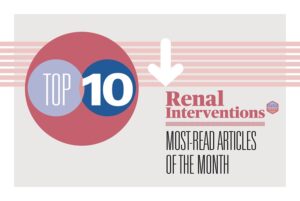 The month of June gave us insight into the future of standard-of-care, updates from meetings, and what can be achieved “with a bit of imagination”, with an advertorial from Laminate Medical Technologies about their new extravascular support device, a discussion of at-home dialysis and the role that peritoneal dialysis can play, and several updates from the Charing Cross (CX) International Symposium (23–25th April, London, UK).
The month of June gave us insight into the future of standard-of-care, updates from meetings, and what can be achieved “with a bit of imagination”, with an advertorial from Laminate Medical Technologies about their new extravascular support device, a discussion of at-home dialysis and the role that peritoneal dialysis can play, and several updates from the Charing Cross (CX) International Symposium (23–25th April, London, UK).
At the recent Endo Vascular Access (EVA) meeting (14–15 June, Patras, Greece), Renal Interventions editorial board member Ziv Haskal (University of Virginia School of Medicine, Charlottesville, USA) spoke to Timothy Clark (Perelman School of Medicine at the University of Pennsylvania, Philadelphia, USA) about what they referred to as the “gold rush” of thrombectomy devices for large-calibre blood vessels.
Peritoneal dialysis (PD) is often foreshadowed by the dual spectre of fear of infection and peritonitis. “This happens because many nephrologists only see complications when patients are admitted [into hospital] and not the many fit patients in the community.
This advertorial is sponsored by Laminate Medical Technologies. At the 2024 Charing Cross (CX) International Symposium (23–25 April, London, UK), the Vascular Access Masterclass Controversies session delved into the question, ‘We have new technology, but do we need it?’ Among the notable presentations, Ellen Dillavou (WakeMed Heart Center, Raleigh, USA), ignited discourse on whether extravascular support should redefine the standard of care in surgical fistula creation.
With 40 years of experience working in nephrology, a passion for advancing the fields of nephrology and kidney disease, and a love of crafting, vascular access marketing manager at Transonic Systems, Deborah Brouwer-Maier (Lansdale, USA), speaks to Renal Interventions about her career as a dialysis nurse, the importance of training and multidisciplinary teams, and her hopes for the future of dialysis care.
Xeltis has announced that it has gained approval from the US Food and Drug Administration (FDA) for an investigational device exemption (IDE) submission to begin enrolling patients into a pivotal study for aXess.
Invizius has recently announced via press release that eight patients have been successfully treated at the National Institute for Health and Care Research (NIHR) Manchester Clinical Research Facility (CRF) with its novel product, H-Guard priming solution, in the company’s first-in-human Phase 1 clinical study.
Findings from the ATTEMPT (The adolescent type 1 diabetes treatment with SGLT2i for hyperglycaemia and hyperfiltration trial) study that show that a low dose of SGLT2 inhibitor could safely be given to youth and adolescents with type 1 diabetes to improve kidney function and glycaemic management have recently been announced in a press release from the American Diabetes Association (ADA).
Dimitrios Karnabatidis, Konstantinos Katsanos, and Panos Kitrou (University of Patras, Patras, Greece), the directors of the Endo Vascular Access (EVA) meeting, together write about their upcoming meeting (14–15 June, Patras, Greece), discussing what they hope to accomplish through the meeting, what attendees can expect at this year’s event, and the importance of collaboration between societies.
Following the publication of the updated UK Kidney Association (UKKA) clinical practice guidelines on the treatment of acute hyperkalaemia in adults in 2023, Renal Interventions spoke to Annette Alfonzo (Victoria Hospital Kirkcaldy, Fife, UK) about the current state of hyperkalaemia in the UK, what has been updated in the guidelines, and why these changes are so important.
During this year’s Charing Cross (CX) International Symposium (23–25th April, London, UK), the first day saw two separate sessions titled ‘Real Cases, Real Problems’, split across the Vascular Access Masterclass and Renal Interventions Controversies sessions. Each session looked at an example of a real case and asked the audience to suggest treatment options, exploring how different clinicians would solve issues that occurred in each case, before exploring how the patients were treated at the time.











